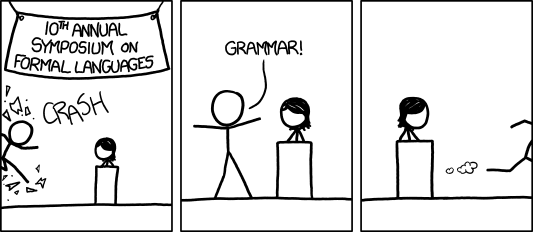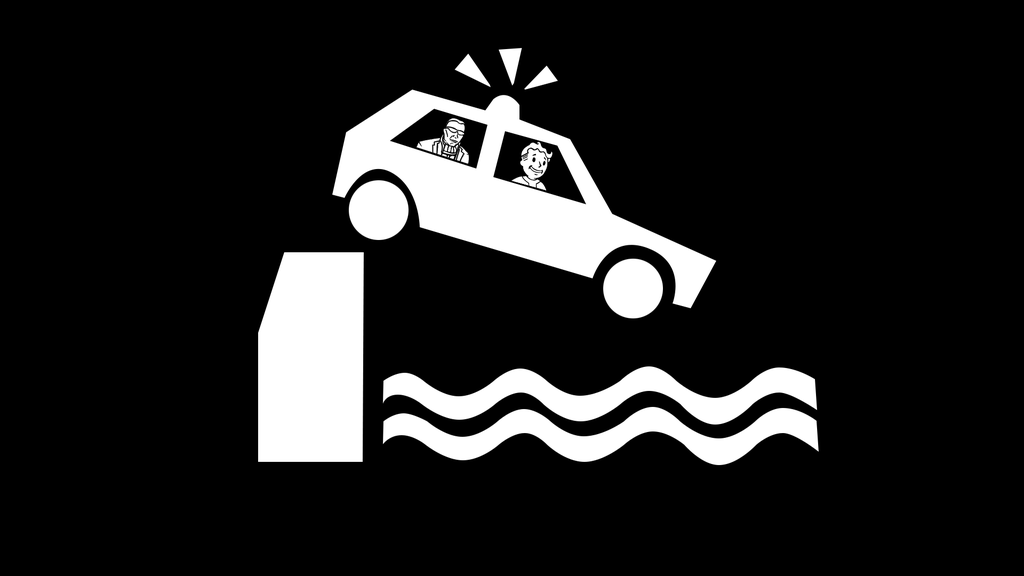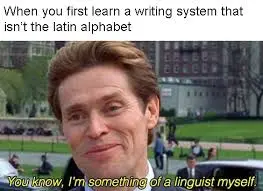This community is bizarre and probably the most genuine one I’ve stumbled upon. How do I consistently get more comments then updoots here?
You seem to be looking for the word fuck.
Theoretically, yes. In practice, no. Suppose
blabecomes a everything word. If anyone asks whatblameans, you say it meansbla. The other person won’t understand, you persist onbla bla blameaningbla means bla, by which bla can mean anythingand you realize that it just doesn’t work, because if it “means anything”, in reality it means nothing.Than*
Yes yes, yes yes yes. Yes, yes yes yes yes, yes yes yes!
Smurf yeah we can.
Smurfing hell… I thought I was going to be the smartass in this thread.
Marklar
Edit: I just have to bitch about a stupid website called GIFer that uses mp4 not gif… Stupid.

Some of these GIF hosts can be pretty obtuse. I was able to get at this GIF by going to the embed page and clicking/tapping the “copy link” button. In this case, the only difference in the two URLs was the file extension.
Marklar yea, marklar.
Aladeen
☹️😐🙂😐☹️😐🙂
Buffalo buffalo Buffalo buffalo buffalo buffalo Buffalo buffalo
https://en.wikipedia.org/wiki/Buffalo_buffalo_Buffalo_buffalo_buffalo_buffalo_Buffalo_buffalo
The the the the the, the the the the the the the the; the the the the the the.
Fuck fuck fuck fuck fuck fuck
Buffalo buffalo Buffalo buffalo buffalo buffalo Buffalo buffalo.
Police police police police. Police police police police police police.
I saw a mechanic throw down a wrench and shout “the fuck-fucking fucker’s fucking fucked AGAIN” and we all knew the deadline needed a push.
You’ve certainly shown the diversity of the word.
mother-motherfuck
mother-motherfuck-fuck
motherfuck, motherfuck,
Noinch noinch noinch.
I am groot.
I am Groot.
Not really. A word with every meaning is meaningless itself, since it doesn’t allow you to narrow down the word’s intended meaning from the set of all possible meanings.

[audience looks around] ‘What just happened?’ ‘There must be some context we’re missing.’
Gary, Gary… Gary?
deleted by creator
Professional academic linguist here. (Yes, that’s a thing.)
Words have the meanings that communities apply to them. There is no governing body over word meanings. There can be a tension (e.g. two groups using the same term in different ways), but that doesn’t really mean that the word means both. Words mean different things to different groups. It has to be this way, for epistemic and pragmatic reasons.
In that sense, meanings are not consciously assigned. So the answer to your original question could be “no”.
But in another sense, all meanings are possible for any given meaningful sequence around the world. Which means, in principle, given infinite communities of practice, a word could have infinite meanings. A stretch, of course.
Edit:
There is no governing body over word meanings
I’m speaking here in terms of global English. There are some languages that have governing bodies, or at least bodies that claim to be governing bodies, like French with the Académie Française. But this is not at all the norm.
Or, to put it another way, (unprofessional academic linguist here), a word has meanings by what you mean by it, and what the listener understands it to mean.
In a sense, it can mean anything you want it to. In another sense, it can mean anything the listener/reader interprets it as. Most useful though is when you mean the same meaning that the listener understands.
And for “accepted/official meaning”, that’s just a community all agreeing on a meaning. Optionally with a recognised group (e.g. dictionary writer) affirming certain meanings as accepted in the community.
I think you’re getting at intended meaning versus received meaning. Which is totally a thing, but intended meaning is far less well understood than accepted meaning (not necessarily at the word level, but definitely at the sentence level).
At the sentence level, companies pay big money to have tens of thousands of sentences manually annotated for intended meaning (to try and train AI to be able to discern it automatically).
Professional academic linguist
🧐
It means I’m not a translator and I don’t work on one particular language (which is typically termed as an academic linguist), but I’m also based in industry.
Yes, literally.
“Dude”
Sweeeet











